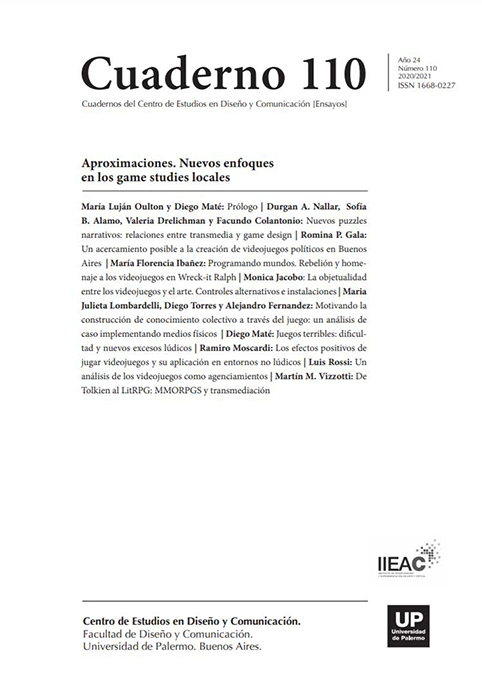Motivando la construcción de conocimiento colectivo a través del juego: un análisis de caso implementando medios físicos
Resumo
Atualmente, o jogo é analisado como um elemento importante para motivar a interação dos usuários em diferentes tipos de ambientes. Essa análise resultou na promoção de diferentes estratégias para adaptar elementos de jogos e videogames em contextos que não são desenhados como tal, mas nos quais busca estimular a participação dos usuários. Uma estratégia na aplicação de elementos de jogo é considerar um modelo centrado na experiência do usuário. No entanto, para estabelecer um design de jogo em contextos onde o aspecto colaborativo prevalece, é necessário abordar estratégias específicas focadas em seu relacionamento com a comunidade à qual você pertence. Este artigo introduz o desenho de um ambiente gaded baseado no quadro conceitual G.A.M.E. para coleta, análise, modelagem e execução, (gathering, analysis, modeling and execution) aplicado a uma comunidade de construção colaborativa de conhecimento de Boas Práticas Horticulturais, complementado por uma interface física.
Referências
Azouz, O. y Lefdaoui, Y. (2018). Gamification design frameworks: A systematic mapping study. 2018 6th International Conference on Multimedia Computing and Systems (ICMCS), 1-9. Recuperado de: https://doi.org/10.1109/icmcs.2018.8525900
Brito, J., Vieira, V., & Duran, A. (2015). Towards a Framework for Gamification Design on Crowdsourcing Systems: The G.A.M.E. Approach. 2015 12th International Conference on Information Technology - New Generations, 445-450. https://doi.org/10.1109/ITNG.2015.78
Buckley, P., Noonan, S., Geary, C., Mackessy, T., & Nagle, E. (2019). An Empirical Study of Gamification Frameworks. Journal of Organizational and End User Computing (JOEUC), 31(1), 22-38.
Buenas prácticas agrícolas (2019). Wikipedia. https://es.wikipedia.org/w/index.php?title=Buenas_pr%C3%A1cticas_agr%C3%ADcolas&oldid=121829980
Crowdsourcing (2020). Wikipedia, la enciclopedia libre. Recuperado el 7 de Febrero de 2020 de https://es.wikipedia.org/wiki/Crowdsourcing
Cugelman, B. (2013). Gamification: What it is and why it matters to digital health behavior change developers. JMIR Serious Games, 1(1), e3-e3. PubMed. https://doi.org/10.2196/games.3139
Deterding, S., Dixon, D., Khaled, R. y Nacke, L. (2011). From Game Design Elements to Gamefulness: Defining «Gamification». Proceedings of the 15th International Academic MindTrek Conference: Envisioning Future Media Environments. 9–15. https://doi.org/10.1145/2181037.2181040 Featured articles. (2020). Wikipedia. Recuperado el 7 de Febrero de 2020 de https:// en.wikipedia.org/w/index.php?title=Wikipedia:Featured_articles
Garat, J. J., Ahumada, A., Otero, J., Terminiello, L., Bello, G. y Ciampagna, M. L. (2009). Las hortalizas típicas locales en el cinturón verde de La Plata: Su localización, preservación y valorización. Horticultura Argentina, 28(66), 32-39.
Hunicke, R., LeBlanc, M., & Zubek, R. (2004, July). MDA: A formal approach to game design and game research. Proceedings of the AAAI Workshop on Challenges in Game AI.
Interfaz de programación de aplicaciones (2019). Wikipedia. Recuperado el 7 de Febrero de 2020 de https://es.wikipedia.org/w/index.php?title=Interfaz_de_programaci%C3%B3n_ de_aplicaciones&oldid=122204387
Landers, R. N., Auer, E. M., Collmus, A. B. y Armstrong, M. B. (2018). Gamification science, its history and future: Definitions and a research agenda. Simulation & Gaming, 49(3), 315-337.
Lindsey, D. (2010). Evaluating quality control of Wikipedia’s feature articles. First Monday, 15(4). Recuperado de https://doi.org/10.5210/fm.v15i4.2721
Manney, P. J. (2008). Empathy in the Time of Technology: How Storytelling is the Key to Empathy. Journal of Evolution & Technology, 19(1).
Massa, G. D., Kim, H.-H., Wheeler, R. M. y Mitchell, C. A. (2008). Plant Productivity in Response to LED Lighting. HortScience, 43(7), 1951-1956. Recuperado de https://doi.org/10.21273/HORTSCI.43.7.1951
MediaWiki. (s. f.). Recuperado 25 de enero de 2020, de https://www.mediawiki.org/wiki/
MediaWiki Mondada, F. y Legon, S. (2001). Interactions between Art and Mobile Robotic System Engineering. T. Gomi (Ed.) Evolutionary Robotics. From Intelligent Robotics to Artificial Life (pp. 121–137). Springer: Berlin.
Mora, A., Riera, D., González, C., & Arnedo-Moreno, J. (2017). Gamification: A systematic review of design frameworks. Journal of Computing in Higher Education, 29(3), 516-548. Recuperado de https://doi.org/10.1007/s12528-017-9150-4
Morschheuser, B., Hamari, J., & Koivisto, J. (2016, January). Gamification in crowdsourcing: a review. In 2016 49th Hawaii International Conference on System Sciences (HICSS) (pp. 4375-4384). IEEE.
Morschheuser, B., Hamari, J., Koivisto, J. y Maedche, A. (2017). Gamified crowdsourcing: Conceptualization, literature review, and future agenda. International Journal of HumanComputer Studies, 106, 26-43.
Morschheuser, B., Hamari, J. y Maedche, A. (2019). Cooperation or competition – When do people contribute more? A field experiment on gamification of crowdsourcing. International Journal of Human-Computer Studies, 127, 7-24. Recuperado de https://doi.org/10.1016/j.ijhcs.2018.10.001
Narayan, S., Orlowitz, J., Morgan, J., Hill, B. M., & Shaw, A. (2017, February). The Wikipedia Adventure: field evaluation of an interactive tutorial for new users. Proceedings of the 2017 ACM Conference on Computer Supported Cooperative Work and Social Computing (pp. 1785-1799).
Oceja, J., & Sierra-Obregón, Á. (2018, October). Gamifiying Wikipedia?. In European Conference on Games Based Learning (pp. 504-XXII). Academic Conferences International Limited.
Papale, L. (2014, junio 22). Beyond Identification: Defining the Relationships between Player and Avatar. Journal of Games Criticism. Recuperado de: http://gamescriticism.org/articles/papale-1-2
Outreach Wiki. (s. f.). The Wikipedia Adventure. Recuperado 23 de enero de 2020. Recuperado de: https://outreach.wikimedia.org/wiki/The_Wikipedia_Adventure
Torres, D., Díaz, A., Cepeda, V., Correa, F. y Fernández, A. (2017). Nodos: Encyclopedia of the Performing Arts. Revista Colombiana de Computación, 18(2), 33-46. Recuperado de https://doi.org/10.29375/25392115.3216
Uchoa, A. P., Esteves, M. G. P. y Souza, J. M. de. (2013). Mix4Crowds - Toward a framework to design crowd collaboration with science. Proceedings of the 2013 IEEE 17th International Conference on Computer Supported Cooperative Work in Design (CSCWD), 61-66. Recuperado de https://doi.org/10.1109/CSCWD.2013.6580940
Wenger, E. (2020). Communities Of Practice: A Brief Introduction. STEP Leadership Workshop. University of Oregon. Recuperado de https://scholarsbank.uoregon.edu/xmlui/handle/1794/11736
The Distributed Game. (s. f.). Wikidata. Recuperado 11 de abril de 2019. Recuperado de https://tools.wmflabs.org/wikidata-game/distributed/
Wikipedia. (2020) Wikipedia. Recuperado el 7 de Febrero de 2020. Recuperado de https://es.wikipedia.org/w/index.php?title=Wikipedia
WikiCup (2020). Wikipedia. Recuperado de https://en.wikipedia.org/w/index.php?title=Wikipedia:WikiCup
Wöhner, T., & Peters, R. (2009, October). Assessing the quality of Wikipedia articles with lifecycle based metrics. Proceedings of the 5th International Symposium on Wikis and Open Collaboration (pp. 1-10).
Los autores/as que publiquen en esta revista ceden los derechos de autor y de publicación a "Cuadernos del Centro de Estudios de Diseño y Comunicación", Aceptando el registro de su trabajo bajo una licencia de atribución de Creative Commons, que permite a terceros utilizar lo publicado siempre que de el crédito pertinente a los autores y a esta revista.


